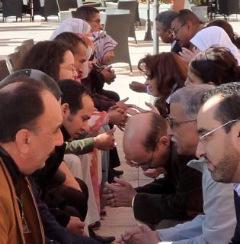Date: 16-18 December 2009
 Country: Morocco
Country: Morocco
Over 25 civil society activists from four Maghreb countries attended a three-day seminar on strategic communications in Marrakesh in December.

The seminar was organized by the London-based Media Diversity Institute, as part of a two-year responsible journalism pilot project in Morocco. The international activists included a wide range of civil society groups including human rights lawyers from Algeria, family planning and disability specialists from Tunisia, and anti-corruption and NGO support organizations from Mauritania.
The Moroccan organizations were primarily from local civil society associations in and around Marrakech, Tahenaout, Ouarzazate, Souira and Tata. Many of these organizations were planning events in the coming weeks, or had experienced problems in getting their messages across to a wide variety of audiences. One CSO based 75 kilometers outside Ouarzazate was attempting to convince men in 10 remote villages on the benefits of allowing their wives and daughters to read, with great success. One activist shared her problems in persuading a Maghreb Minister of Education to accept and act upon physical abuse against children in schools. By working with the activist through the communication tools, international trainer Tim Wiliams reworked the approach so that the activist could approach the minister again with more achievable objectives, which would ultimately move her towards her goals.
 The course provided practical tools for communications strategies as well as hands on journalistic practice, such as writing press releases.
The course provided practical tools for communications strategies as well as hands on journalistic practice, such as writing press releases.
In the first hour, the 26 trainees attended a “power meeting”, where they were each given the opportunity to introduce themselves and their organization in 30 seconds, 13 times. By the sixth introduction they were beginning to make their presentations more concise, and realized how much they could fit into that time, if they had a prepared structure.
On the final day local trainer Radio Maroc presenter, Mr Safi Naciri and a camera crew interrogated the participants in a “live” interview session. The play back session allowed participants not only to see themselves on screen, but also to share comments and experiences on each other’s performance.
Trainees said the course was “rich” in content and many were already applying the lessons learned. One trainee had to send a press release the evening after the session on the same subject. The following day she reported that she had added photographs of the event, something her NGO had never considered before. One trainee said she had never attended a working lunch, and would use the example of inviting experts to debate a topic over lunch in her own activities. Finally one activist said it was very important that despite political differences, Maghreb professionals could be trained together and exchange experiences facing civil society groups.
For more info contact mona.elhamdani@media-diversity.org